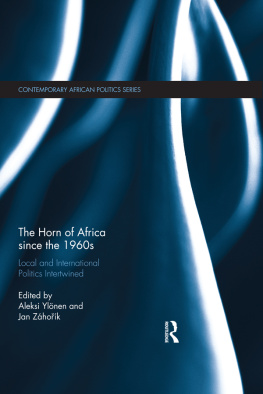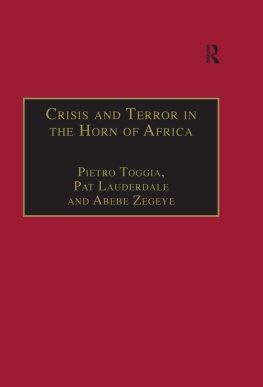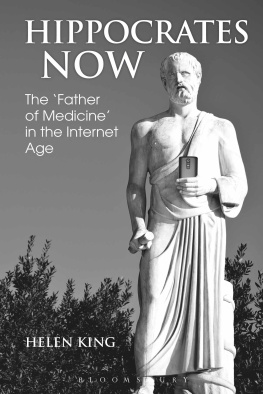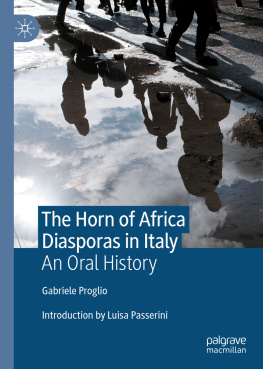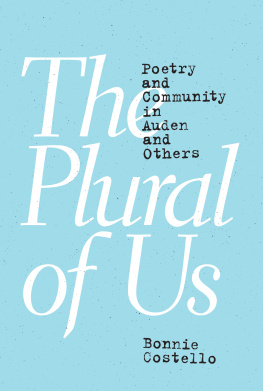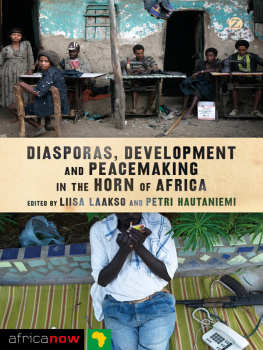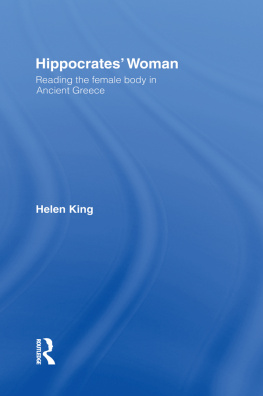Plural Medical Systems in the Horn of Africa
Monographs from the African Studies Centre,
Leiden
Plural Medical Systems in the Horn of Africa
The Legacy of Sheikh Hippocrates
Leendert Jan Slikkerveer
First published in 1990 by
Kegan Paul International
This edition first published in 2010 by
Routledge
2 Park Square, Milton Park, Abingdon, Oxon, OX14 4RN
Simultaneously published in the USA and Canada
by Routledge
711 Third Avenue, New York, NY 10017
Routledge is an imprint of the Taylor & Francis Group, an informa business
African Studies Centre, Leiden 1990
All rights reserved. No part of this book may be reprinted or reproduced or utilised in any form or by any electronic, mechanical, or other means, now known or hereafter invented, including photocopying and recording, or in any information storage or retrieval system, without permission in writing from the publishers.
British Library Cataloguing in Publication Data
A catalogue record for this book is available from the British Library
ISBN 10: 0-7103-0203-7 (hbk)
ISBN 13: 978-0-7103-0203-8 (hbk)
Publishers Note
The publisher has gone to great lengths to ensure the quality of this reprint but points out that some imperfections in the original copies may be apparent. The publisher has made every effort to contact original copyright holders and would welcome correspondence from those they have been unable to trace.
Contents
Foreword
The majority of the population in the Third World nations is located in rural areas which have only limited access to national health delivery systems. As populations continue to grow and pressures on national economies increase, the constraints faced by ministries of health in their efforts to expand the cosmopolitan health care system to the rural sectors are expected to become more difficult. Given these serious health planning circumstances, it is critical that we identify, understand, and evaluate the range of indigenous, regional and cosmopolitan therapeutic systems which already exist in most areas and together comprise the national health system. Such an analysis is necessary for national health planners as they seek new strategies for improving the quality of health care available, particularly in the rural areas.
This study is an important landmark in our understanding of the complexities of pluralistic medical systems. It is an unusual study as it provides an overview of the indigenous Oromo and Amhara, the regional Greaco-Arabic, and the cosmopolitan health systems in the Horn of Africa, using a variety of approaches and methodologies.
A socio-historical approach is used to explore the complex development of African, Greaco-Arabic, and European medical traditions in the multi-ethnic community of Babile in the Eastern Highlands of Ethiopia. It is in this historical context that we learn of the link between the Arabic healing tradition in Babile and the medical traditions attributed to Sheikh Hippocrates.
The methodologies of comparative ethnomedicine provide us with insights into each of the alternative medical traditions which co-exist in Babile. Each system is based on its own disease classification structure and each is distinguished by different categories of healers and therapy options.
Using survey methodologies and a multivariate model of transcultural health care utilisation, a range of variables such as ethnicity, religion, age, gender, occupation and household size is analysed in terms of the factors which influence choices among the therapeutic options available to the citizens of Babile.
By using this array of approaches and methodologies, it is possible to provide a holistic and comprehensive description, analysis and explanation of the health delivery system characteristic of this part of the Horn of Africa. The author is in a position to recommend ways in which health planners can recognise the variety of medical systems as a national resource base for more culturally appropriate and integrative approaches to health care.
Although this multi-disciplinary approach is limited in this study to the Eastern Highlands of Ethiopia, it is expected to provide an important global model for other studies elsewhere in the developing world. Training and research on this ethnomedical approach to understanding the nature and role of pluralistic health delivery systems are being provided through the Leiden Ethnosystems And Development program (LEAD) in The Netherlands and the Center for Indigenous Knowledge for Agriculture and Rural Development (CIKARD) in the U.S.A.
Prof. Dennis M. Warren
Technology and Social Change Program
Iowa State University, Ames, U.S.A.
April 1988
Acknowledgements
Babile, a multi-ethnic community in the Ethiopian-Somali borderland in the Horn of Africa forms the research area for the study into the health care utilisation process of various medical systems by different ethnic groups in the highlands: Oromo, Somali and Amhara. As a first follow-up study to the preceding Rural Health in Ethiopia project among the Kottu Oromo of Hararghe by Buschkens and Slikkerveer (1982), this book is based on an analysis of relevant literature in the medical social sciences and on fieldwork carried out between 1976 and 1982. Several modifications for adaption to the specific pluralist situation in Babile were introduced. These include additional tests for longitudinal health interview and household surveys among different ethnic groups, an expanded conceptual framework for the development of a theoretical model of transcultural health care utilisation, and an extended network of explanatory variables. Improvements in communications and the general logistics of the fieldwork were necessary to permit the team to continue to operate in the highlands under the extremely difficult circumstances of increased guerilla activities, separatist movements and the Ethiopian-Somali warfare in the Ogaden during 1977/1978.
The success and finalisation of this study would not have been possible without the unceasing advice, support and cooperation of a large number of institutions and individuals contributing to the Babile study in a variety of ways. In the first place, I feel most indebted to the former Director and staff of the Institute of Development Research of the University of Addis Ababa and particularly wish to thank Dr. Assefa Mehretu, Dr. Teshome Mulat and Dr. Fasil Gebre Kiros who all strongly supported the study despite the trying situation of the university in Ethiopia immediately after the revolution of 1974.
Also, I owe a great deal to the members of the field team from the study area, Ali Abdi (the team leader), Hamza Adam, Mustafah Abdulahi, Mumi Umer and the late Abdul Hafiz, and to Dr. Ahmed Nagi, Director of the Government Hospital in Dire Dawa and Dr. Zemed of the French Hospital in Dire Dawa and their staff. Mr. Beyenne Haile assisted as driver and logistic assistant in the field. Without their year-long motivation and perseverance, I could not have carried out the research in Babile.
I am much indebted to staff members and colleagues of the Institute of Cultural and Social Studies of the University of Leiden. Especially, the late Professor Emeritus R.A.J. van Lier, who supervised the research projects in Ethiopia and Dr. W.F.L. Buschkens with whom I had the pleasure to share weal and woe during the project. Likewise, Dr. W.H.J.C. Dechering who in consultation with Dr. R. Niemeyer of the African Studies Centre so skilfully dedicated much of his time to the design and execution of the rather advanced data analysis. Here, I also thank Professor J.D. Speckmann for his general support, Dr. W.A.R. Shadid for his kind assistance with the translation and interpretation of Arabic manuscripts and medical textbooks and Professor A.J. Drewes of the Faculty of Literature for accompanying me during several fieldtrips to traditional healers and sheikhs of the regional Arabic medical system in the remote areas of the Eastern Highlands of Ethiopia.




